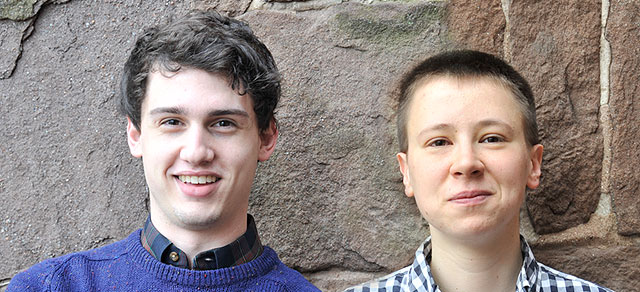Watson Fellows Awarded Year Abroad for Independent Study

Zully Adler ’11 hopes to document cassette culture in five countries while Davy Knittle ’11 aims to explore the relationship between public space and location-based identity in three major cities.
As 2011-12 Thomas J. Watson Fellows, Adler and Knittle will have one year to travel outside the United States for an independent study. Each student receives a $25,000 stipend, which is funded by the Thomas J. Watson Foundation.
The Wesleyan students were among 148 finalists nominated this year to compete on the national level. Of those, only 40 were selected for a fellowship.
Adler, a history major focusing on European history, will travel to Malaysia, Australia, Mexico, Belgium and Sweden for his project titled, “Redubbing the World: Cassette Culture and the Power of DIY Production.”
Adler’s interest in cassette culture stems from running the student radio station in high school, where he hosted local musicians from the Los Angeles area. He observed that most musicians used cheap and recyclable cassette tapes to distribute their own releases and trade music with others.
“[They] issued their cassettes in tiny editions of 10 or 20, each with its distinctive packaging, whether a hand-knit woolen case, a screen-printed poster, or a pile of dead leaves. For these artists, musical production was a labor of love and a way of combining musical and visual arts,” Adler says. “Tapes were rarely sold. Money made people nervous.”
Adler finds that in recent years, musicians have found in cassettes a simple way of restoring engagement to the recording and listening experience. For these artists, cassettes are a vehicle for broadening participation, expressing an anti-commercial aesthetic, and engaging with a range of social and political issues.
“While my Watson Fellowship will be an opportunity to cultivate and broaden my personal interest and commitment to independent art, I hope that it will also encourage cassette producers to take greater interest in each other’s work,” he says. “I would like to share with them what I have learned about the diversity of global cassette culture and stimulate further communication and collaboration.”
Knittle, an English and African American Studies double major, with a concentration in creative writing, will spend his year traveling to Toronto, Canada; Quito, Ecuador and Sydney, Australia for his project titled, “Cities in Transition: Identity, Narrative and the Changing Urban Landscape.”
These particular cities are in the process of implementing long-range strategic plans that will change not only how the cities operate, but how they are designed.
“I am interested in exploring both how those cities have chosen to put those plans into action, and how those structural changes impact how the culture of the city changes, and how narratives of what it means to live in the city change,” Knittle explains. “the relationship between public space and location-based identity in three major cities.
“During my Watson year, I will explore the link between the plans and their impact on the stories that a city in transition tells itself about where it is and where it is going.”
In each of the three cities, he will observe ongoing construction and talk with residents, planners, architects, children, store owners and a range of other urban residents in order to better understand the impact as the plans are implemented.
As Watson Fellows, Adler and Knittle must submit quarterly reports and submit a final report within 30 days of their return to the U.S.
Adler will write a report, combining artistic sensitivity with the analytical methods he developed at Wesleyan. He hopes the experience as a Watson Fellow will serve as a stepping-stone into the disciplines of visual studies and material culture, which he plans to pursue in post-graduate studies.
Knittle will use what he sees and learns in personal interviews to write a series of profiles and a collection of poems. Knittle also plans to attend graduate school and obtain a MFA in poetry.

